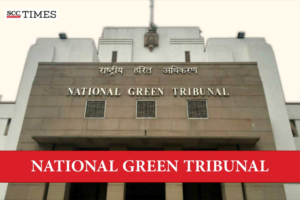National Green Tribunal: In a suo motu matter based on a news article reporting a jaundice outbreak in Pahnoo Village, Shopian, due to contaminated water, allegedly due to failure by the Jal Shakti Department to ensure safe drinking water, a 3-member bench of Prakash Shrivastava, (Chairperson), Arun Kumar Tyagi (Judicial Member), JJ., and Dr. A. Senthil Vel (Expert Member), held authorities accountable for the health and safety of Shopian residents regarding water and sanitation and issues specific directives for remedial actions and further monitoring by the NGT.
The instant matter originated from a news item titled “Jaundice Outbreak Hits Shopian; Contaminated Water Suspected,” published on 31-01-2024, in Kashmir Life. The report highlighted a jaundice outbreak in Pahnoo Village, Shopian, with locals alleging that the Jal Shakti Department failed to ensure safe drinking water, leading to widespread illness, especially among children with symptoms including fever and vomiting, and locals reported life-threatening conditions in several cases.
The Deputy Commissioner of Shopian, upon learning of the outbreak, initiated a response including water testing and public awareness drives. Initial tests showed unsatisfactory water quality in some areas, pointing to potential contamination from fecal coliforms.
The NGT took suo moto cognizance and following initial reports, ordered further action by the J&K Pollution Control Committee (PCC) and other authorities, requesting comprehensive water testing and more detailed reports on affected individuals. Though the respondents submitted various reports, the NGT noted that these were insufficient, with unclear information about the water source, lack of effective virological testing facilities, and no substantial indication of corrective measures taken on the ground. The NGT noted that the ICMR’s National Institute of Virology’s test indicated no viral contamination in water samples, however, substantial bacterial contamination was found in household water supplies.
The NGT cited Subhash Kumar v. State of Bihar, (1991) 1 SCC 598, where it was held that “the right to life under Article 21 of the Constitution of India to include the right of enjoyment of pollution free water and air for full enjoyment of life” and P.R. Subhash Chandran v. State of A.P., 1999 SCC OnLine AP 294, where it was held that “the role of the State to provide every citizen with adequate clean drinking water and to protect water from getting polluted is not only a fundamental Directive Principle in the governance of the State, but is also a penumbral right under Article 21 of the Constitution of India.”
The NGT emphasised on the right to clean water as part of the fundamental right to life under Article 21 of the Constitution of India, reinforced by UN Resolution 64/292. The NGT also highlighted the Jammu and Kashmir Government’s statutory duties under the Water Resources (Regulation and Management) Act, 2010, and other environmental laws, and held that the supply of unsanitary water is a breach of both legal and constitutional obligations.
The NGT found that the reports filed by the respondents were inadequate and casually prepared, lacking comprehensive investigation of water sources, contamination sources, thereby, demonstrating a lack of serious remedial action and non-compliance with the orders of the NGT and statutory obligations.
The NGT directed the Principal Secretary of the Ministry of Health, Deputy Commissioner of Shopian, and the J&K PCC to implement measures for safe drinking water and sanitation within three months as remedial action, including —
-
Tapping of untreated sewage and establishment of sewage treatment plants (STPs).
-
Ensuring no untreated pollutants enter water sources used for drinking.
-
Conducting further virological and bacteriological testing and providing safe drinking water.
The NGT further directed the Member Secretary, J&K Pollution Control Committee (J&K PCC) to file a compliance report within one month after the three-month implementation period, with the Tribunal retaining the right to re-evaluate if necessary. The NGT directed the J&K PCC to enforce compliance with provisions of the Water (prevention and Control of Pollution) Act, 1974 and, if necessary, levy environmental compensation and prosecution of the defaulting officials.
[News item titled “Jaundice Outbreak Hits Shopian; Contaminated Water Suspected” appearing in Kashmir Life dated 31.01.2024, In re, 2024 SCC OnLine NGT 2295, Decided on 06-11-2024]
Advocates who appeared in this case:
Mr. J.N. Sharma, Environment Engineer, J&K PCC and Mr. Raj Kumar, Counsel for the Respondents

